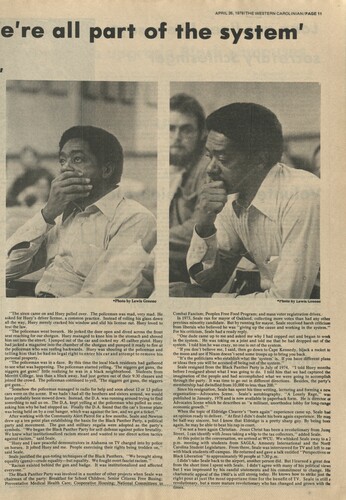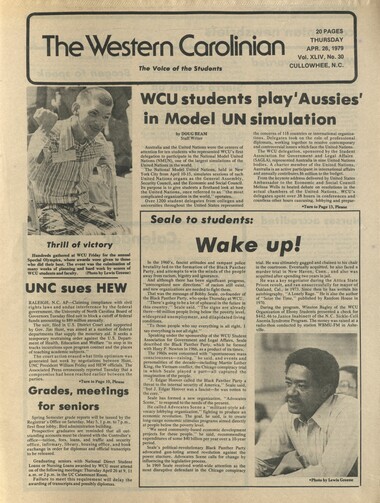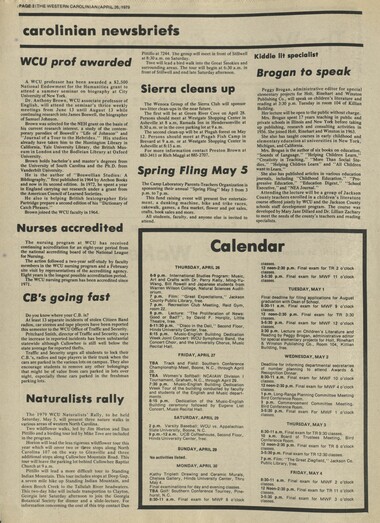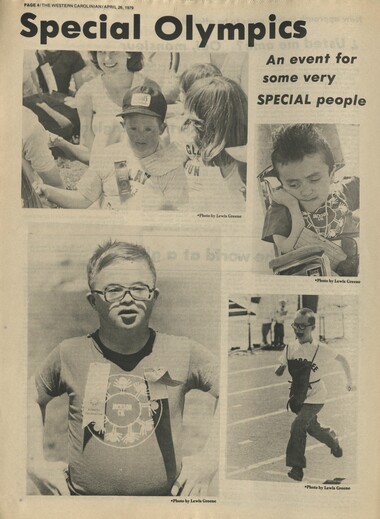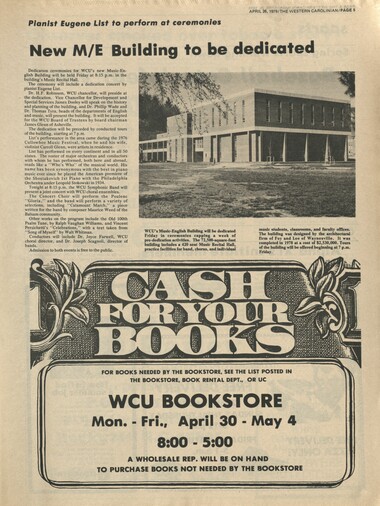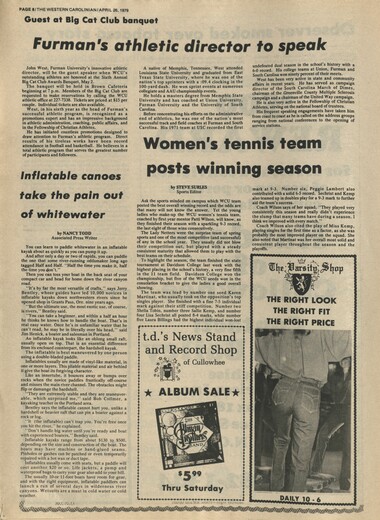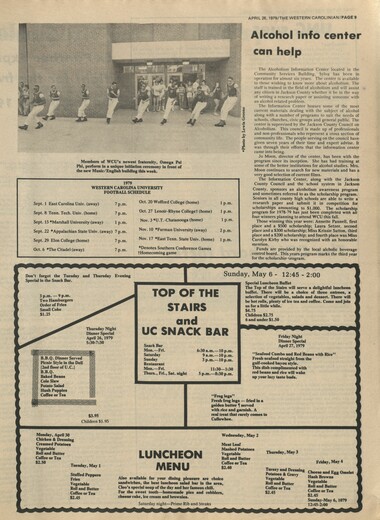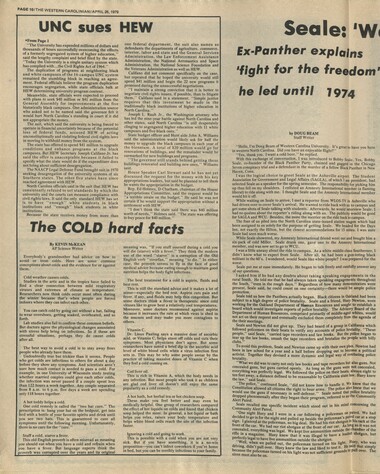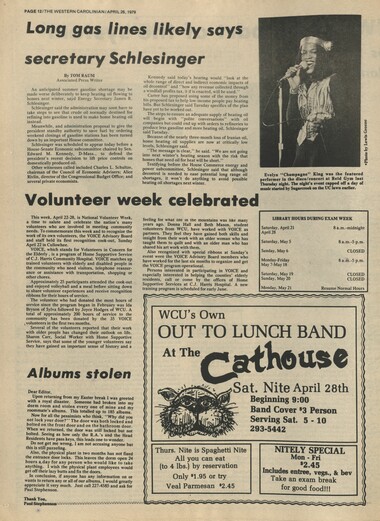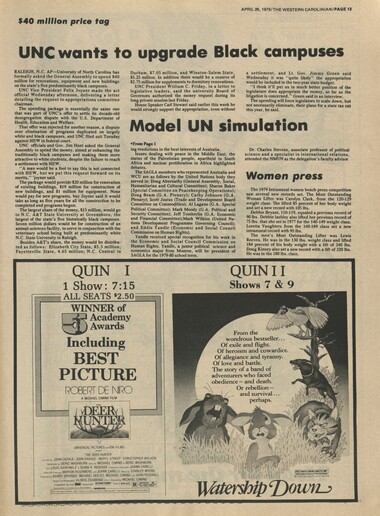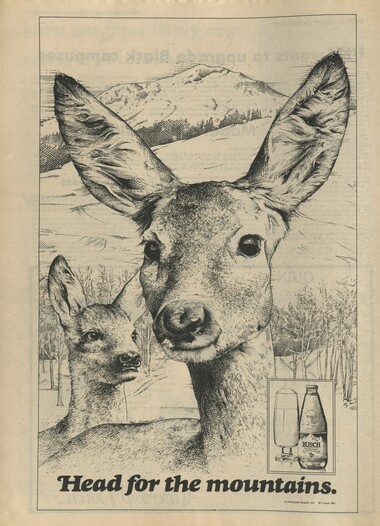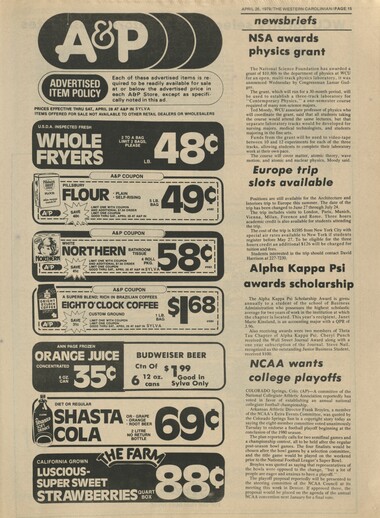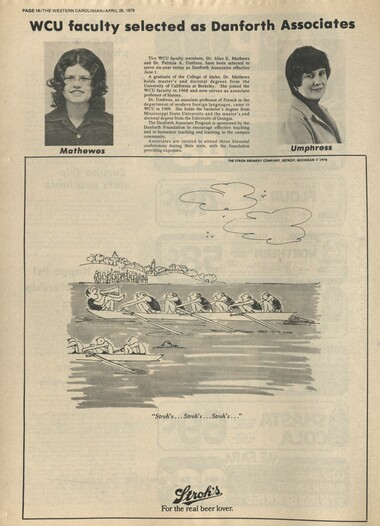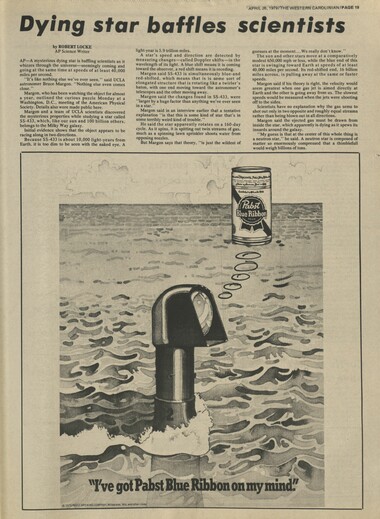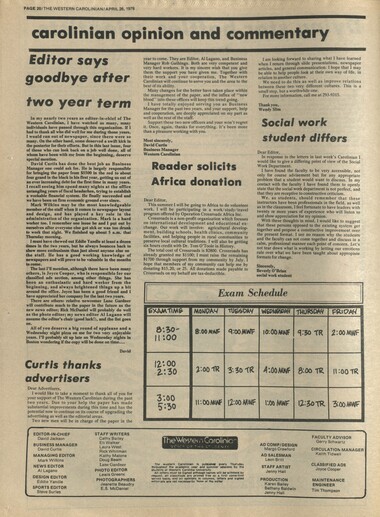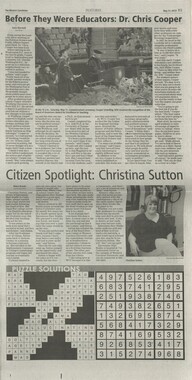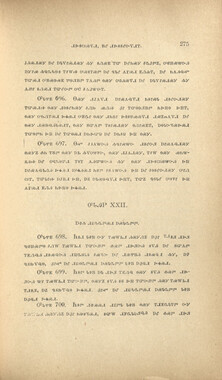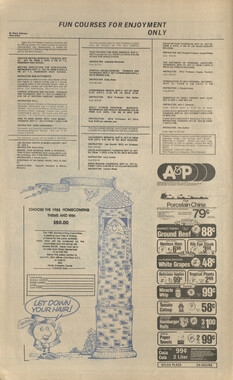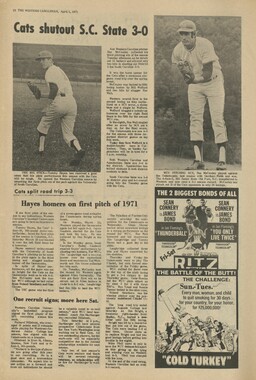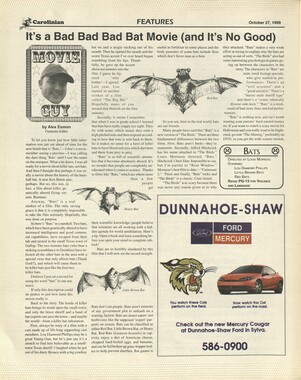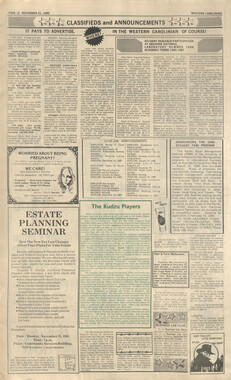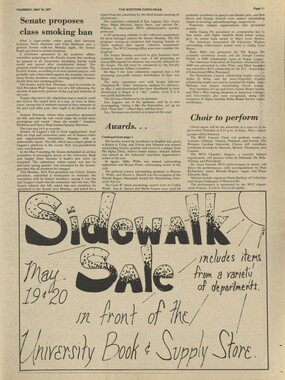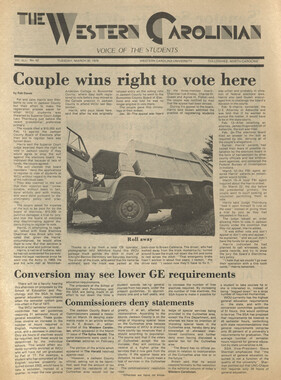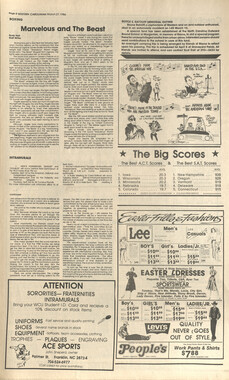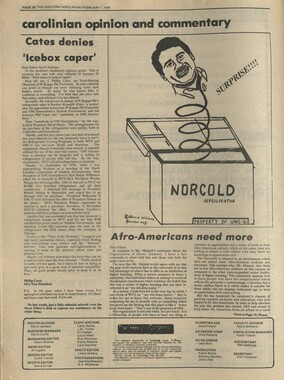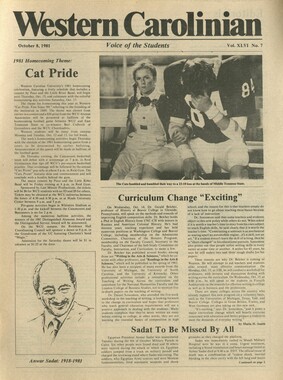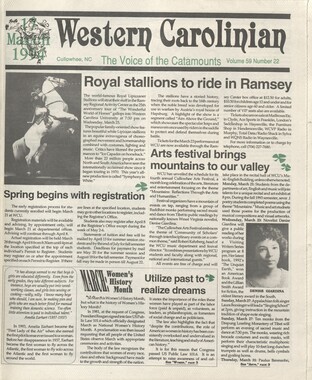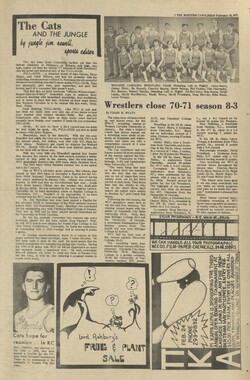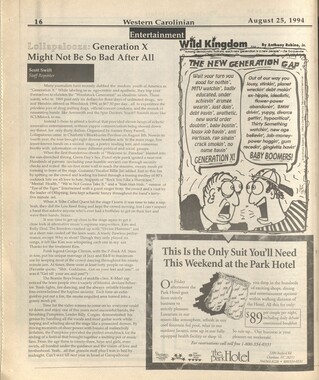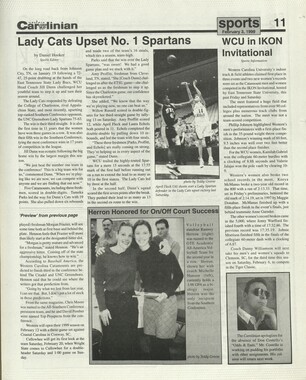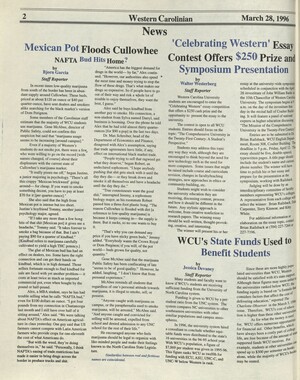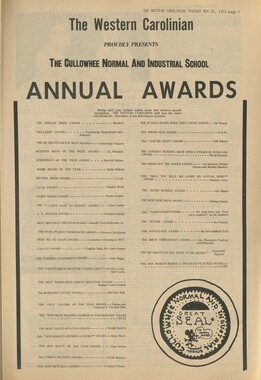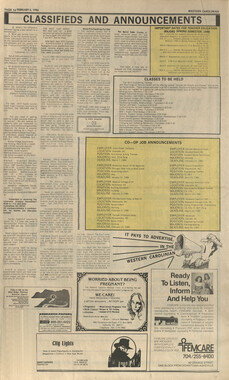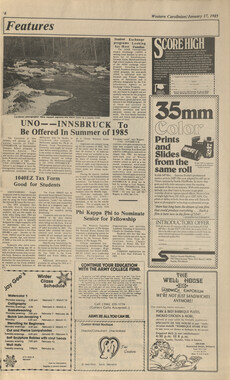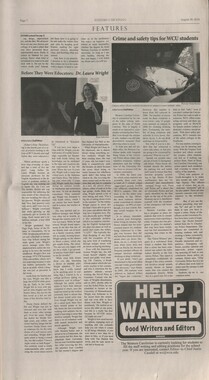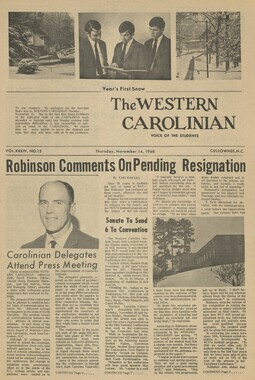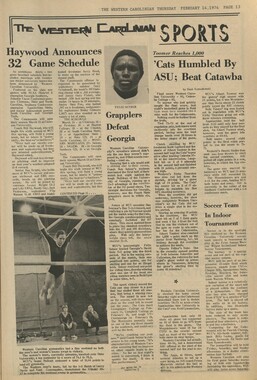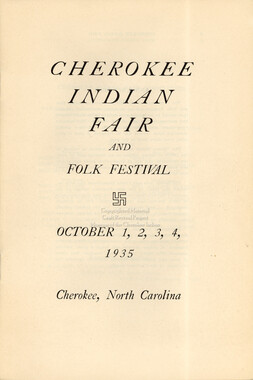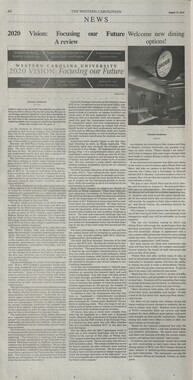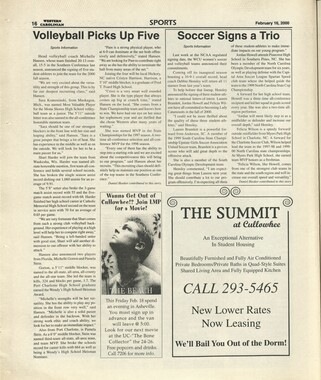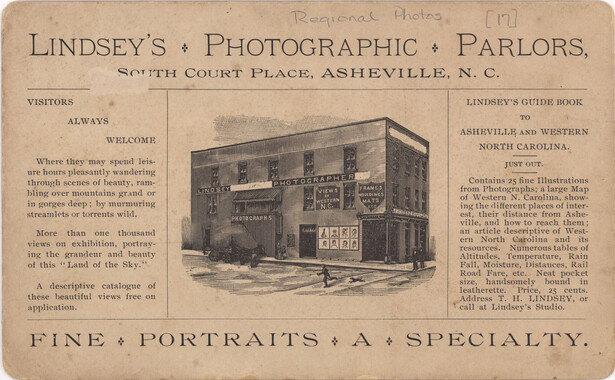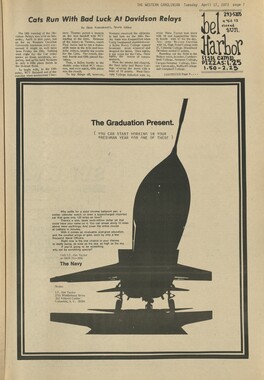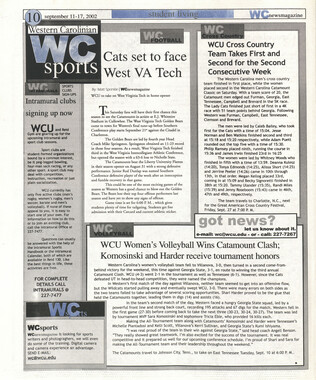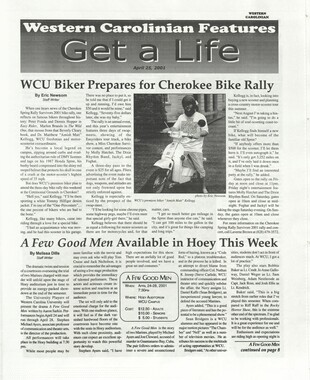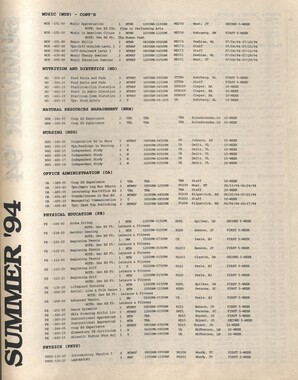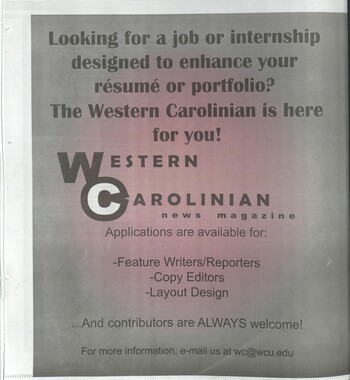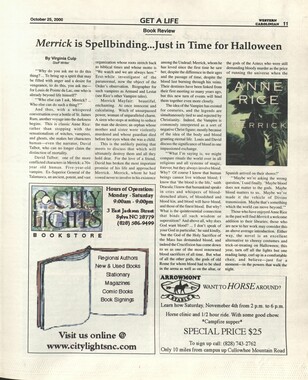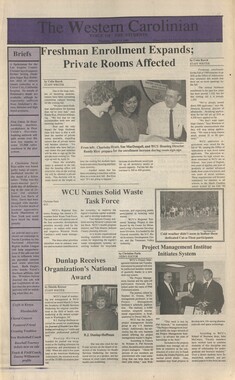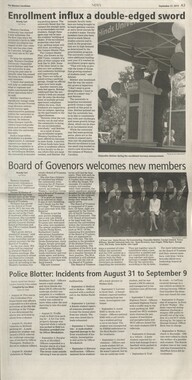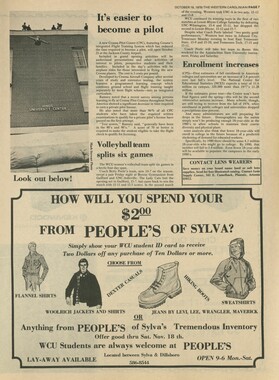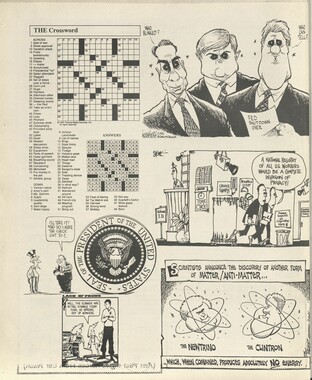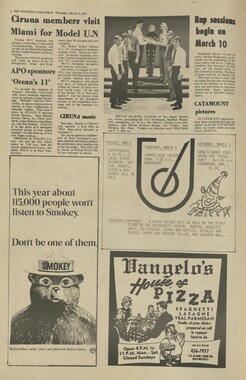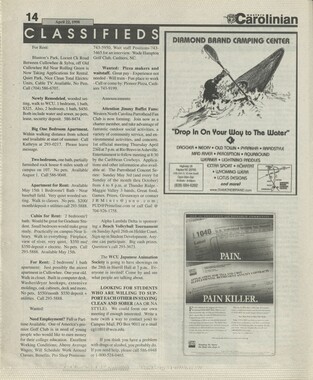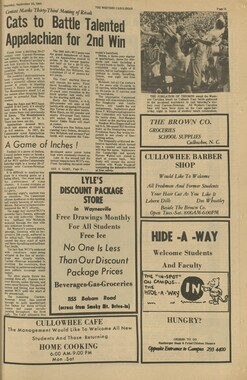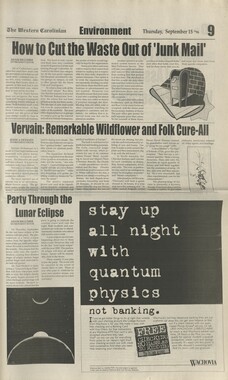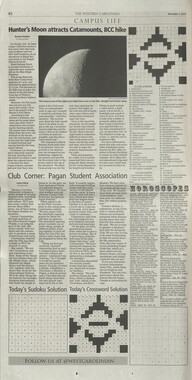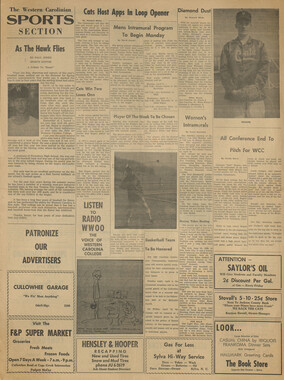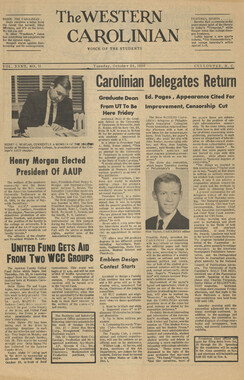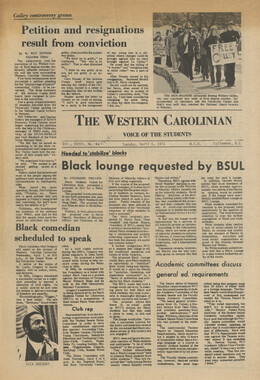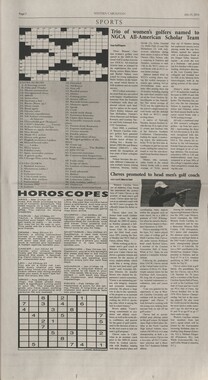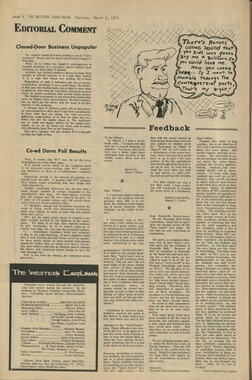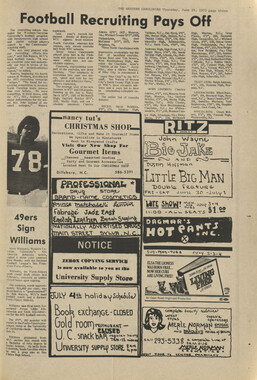Western Carolina University (20)
View all
- Canton Champion Fibre Company (2308)
- Cherokee Traditions (291)
- Civil War in Southern Appalachia (165)
- Craft Revival (1942)
- Great Smoky Mountains - A Park for America (2946)
- Highlights from Western Carolina University (430)
- Horace Kephart (941)
- Journeys Through Jackson (159)
- LGBTQIA+ Archive of Jackson County (85)
- Oral Histories of Western North Carolina (314)
- Picturing Appalachia (6873)
- Stories of Mountain Folk (413)
- Travel Western North Carolina (160)
- Western Carolina University Fine Art Museum Vitreograph Collection (129)
- Western Carolina University Herbarium (92)
- Western Carolina University: Making Memories (738)
- Western Carolina University Publications (2491)
- Western Carolina University Restricted Electronic Theses and Dissertations (146)
- Western North Carolina Regional Maps (71)
- World War II in Southern Appalachia (131)
University of North Carolina Asheville (6)
View all
- Allanstand Cottage Industries (62)
- Appalachian National Park Association (53)
- Bennett, Kelly, 1890-1974 (1463)
- Berry, Walter (76)
- Brasstown Carvers (40)
- Carver, George Washington, 1864?-1943 (26)
- Cathey, Joseph, 1803-1874 (1)
- Champion Fibre Company (233)
- Champion Paper and Fibre Company (297)
- Cherokee Indian Fair Association (16)
- Cherokee Language Program (22)
- Crowe, Amanda (40)
- Edmonston, Thomas Benton, 1842-1907 (7)
- Ensley, A. L. (Abraham Lincoln), 1865-1948 (275)
- Fromer, Irving Rhodes, 1913-1994 (70)
- George Butz (BFS 1907) (46)
- Goodrich, Frances Louisa (120)
- Grant, George Alexander, 1891-1964 (96)
- Heard, Marian Gladys (60)
- Kephart, Calvin, 1883-1969 (15)
- Kephart, Horace, 1862-1931 (313)
- Kephart, Laura, 1862-1954 (39)
- Laney, Gideon Thomas, 1889-1976 (439)
- Masa, George, 1881-1933 (61)
- McElhinney, William Julian, 1896-1953 (44)
- Niggli, Josephina, 1910-1983 (10)
- North Carolina Park Commission (105)
- Osborne, Kezia Stradley (9)
- Owens, Samuel Robert, 1918-1995 (11)
- Penland Weavers and Potters (36)
- Roberts, Vivienne (15)
- Roth, Albert, 1890-1974 (142)
- Schenck, Carl Alwin, 1868-1955 (1)
- Sherrill's Photography Studio (2565)
- Southern Highland Handicraft Guild (127)
- Southern Highlanders, Inc. (71)
- Stalcup, Jesse Bryson (46)
- Stearns, I. K. (213)
- Thompson, James Edward, 1880-1976 (226)
- United States. Indian Arts and Crafts Board (130)
- USFS (683)
- Vance, Zebulon Baird, 1830-1894 (1)
- Weaver, Zebulon, 1872-1948 (58)
- Western Carolina College (230)
- Western Carolina Teachers College (282)
- Western Carolina University (2008)
- Western Carolina University. Mountain Heritage Center (18)
- Whitman, Walt, 1819-1892 (10)
- Wilburn, Hiram Coleman, 1880-1967 (73)
- Williams, Isadora (3)
- Cain, Doreyl Ammons (0)
- Crittenden, Lorraine (0)
- Rhodes, Judy (0)
- Smith, Edward Clark (0)
- Appalachian Region, Southern (2569)
- Asheville (N.C.) (1923)
- Avery County (N.C.) (26)
- Blount County (Tenn.) (195)
- Buncombe County (N.C.) (1672)
- Cherokee County (N.C.) (283)
- Clay County (N.C.) (555)
- Graham County (N.C.) (236)
- Great Smoky Mountains National Park (N.C. and Tenn.) (519)
- Haywood County (N.C.) (3569)
- Henderson County (N.C.) (70)
- Jackson County (N.C.) (4912)
- Knox County (Tenn.) (35)
- Knoxville (Tenn.) (13)
- Lake Santeetlah (N.C.) (10)
- Macon County (N.C.) (420)
- Madison County (N.C.) (215)
- McDowell County (N.C.) (39)
- Mitchell County (N.C.) (132)
- Polk County (N.C.) (35)
- Qualla Boundary (982)
- Rutherford County (N.C.) (76)
- Swain County (N.C.) (2182)
- Transylvania County (N.C.) (270)
- Watauga County (N.C.) (12)
- Waynesville (N.C.) (86)
- Yancey County (N.C.) (72)
- Aerial Photographs (3)
- Aerial Views (60)
- Albums (books) (4)
- Articles (1)
- Artifacts (object Genre) (228)
- Bibliographies (1)
- Biography (general Genre) (2)
- Cards (information Artifacts) (38)
- Clippings (information Artifacts) (191)
- Copybooks (instructional Materials) (3)
- Crafts (art Genres) (622)
- Depictions (visual Works) (21)
- Design Drawings (1)
- Drawings (visual Works) (185)
- Envelopes (73)
- Exhibitions (events) (1)
- Facsimiles (reproductions) (1)
- Fiction (general Genre) (4)
- Financial Records (12)
- Fliers (printed Matter) (67)
- Glass Plate Negatives (381)
- Guidebooks (2)
- Internegatives (10)
- Interviews (815)
- Land Surveys (102)
- Letters (correspondence) (1013)
- Manuscripts (documents) (618)
- Maps (documents) (177)
- Memorandums (25)
- Minutes (administrative Records) (59)
- Negatives (photographs) (6090)
- Newsletters (1290)
- Newspapers (2)
- Notebooks (8)
- Occupation Currency (1)
- Paintings (visual Works) (1)
- Pen And Ink Drawings (1)
- Periodicals (193)
- Personal Narratives (10)
- Photographs (12976)
- Plans (maps) (1)
- Poetry (5)
- Portraits (4568)
- Postcards (329)
- Programs (documents) (181)
- Publications (documents) (2443)
- Questionnaires (65)
- Relief Prints (26)
- Sayings (literary Genre) (1)
- Scrapbooks (282)
- Sheet Music (2)
- Slides (photographs) (402)
- Songs (musical Compositions) (2)
- Sound Recordings (796)
- Specimens (92)
- Speeches (documents) (18)
- Tintypes (photographs) (8)
- Transcripts (322)
- Video Recordings (physical Artifacts) (23)
- Text Messages (0)
- A.L. Ensley Collection (275)
- Appalachian Industrial School Records (7)
- Appalachian National Park Association Records (336)
- Axley-Meroney Collection (2)
- Bayard Wootten Photograph Collection (20)
- Bethel Rural Community Organization Collection (7)
- Blumer Collection (5)
- C.W. Slagle Collection (20)
- Canton Area Historical Museum (2110)
- Carlos C. Campbell Collection (462)
- Cataloochee History Project (64)
- Cherokee Studies Collection (4)
- Daisy Dame Photograph Album (5)
- Daniel Boone VI Collection (1)
- Doris Ulmann Photograph Collection (112)
- Elizabeth H. Lasley Collection (1)
- Elizabeth Woolworth Szold Fleharty Collection (4)
- Frank Fry Collection (95)
- George Masa Collection (173)
- Gideon Laney Collection (452)
- Hazel Scarborough Collection (2)
- Hiram C. Wilburn Papers (28)
- Historic Photographs Collection (236)
- Horace Kephart Collection (861)
- Humbard Collection (33)
- Hunter and Weaver Families Collection (1)
- I. D. Blumenthal Collection (4)
- Isadora Williams Collection (4)
- Jesse Bryson Stalcup Collection (47)
- Jim Thompson Collection (224)
- John B. Battle Collection (7)
- John C. Campbell Folk School Records (80)
- John Parris Collection (6)
- Judaculla Rock project (2)
- Kelly Bennett Collection (1482)
- Love Family Papers (11)
- Major Wiley Parris Civil War Letters (3)
- Map Collection (12)
- McFee-Misemer Civil War Letters (34)
- Mountain Heritage Center Collection (4)
- Norburn - Robertson - Thomson Families Collection (44)
- Pauline Hood Collection (7)
- Pre-Guild Collection (2)
- Qualla Arts and Crafts Mutual Collection (12)
- R.A. Romanes Collection (681)
- Rosser H. Taylor Collection (1)
- Samuel Robert Owens Collection (94)
- Sara Madison Collection (144)
- Sherrill Studio Photo Collection (2558)
- Smoky Mountains Hiking Club Collection (616)
- Stories of Mountain Folk - Radio Programs (374)
- The Reporter, Western Carolina University (510)
- Venoy and Elizabeth Reed Collection (16)
- WCU Gender and Sexuality Oral History Project (32)
- WCU Mountain Heritage Center Oral Histories (25)
- WCU Oral History Collection - Mountain People, Mountain Lives (71)
- WCU Students Newspapers Collection (1923)
- Western North Carolina Tomorrow Black Oral History Project (69)
- William Williams Stringfield Collection (2)
- Zebulon Weaver Collection (109)
- African Americans (390)
- Appalachian Trail (35)
- Artisans (521)
- Cherokee art (84)
- Cherokee artists -- North Carolina (10)
- Cherokee language (21)
- Cherokee pottery (101)
- Cherokee women (208)
- Church buildings (189)
- Civilian Conservation Corps (U.S.) (111)
- College student newspapers and periodicals (2012)
- Dams (107)
- Dance (1023)
- Education (222)
- Floods (61)
- Folk music (1015)
- Forced removal, 1813-1903 (2)
- Forest conservation (220)
- Forests and forestry (1184)
- Gender nonconformity (4)
- Great Smoky Mountains National Park (N.C. and Tenn.) (181)
- Hunting (45)
- Landscape photography (25)
- Logging (119)
- Maps (83)
- Mines and mineral resources (8)
- North Carolina -- Maps (18)
- Paper industry (38)
- Postcards (255)
- Pottery (135)
- Railroad trains (72)
- Rural electrification -- North Carolina, Western (3)
- School integration -- Southern States (2)
- Segregation -- North Carolina, Western (5)
- Slavery (5)
- Sports (452)
- Storytelling (243)
- Waterfalls -- Great Smoky Mountains (N.C. and Tenn.) (66)
- Weaving -- Appalachian Region, Southern (280)
- Wood-carving -- Appalachian Region, Southern (328)
- World War, 1939-1945 (173)
Western Carolinian Volume 44 Number 30
Item
Item’s are ‘child’ level descriptions to ‘parent’ objects, (e.g. one page of a whole book).
-
-
APRIL 26, 1979/THE WESTERN CAROLINIAN/PAGE 11 ere part of the system1 •Photo by Lewis Greene "The siren came on and Huey pulled over. The policeman was mad, very mad. He asked for Huey's driver license, a common practice. Instead of rolling his glass down all the way, Huey merely cracked his window and slid his license out. Huey loved to test the law. "The policeman went berserk. He jerked the door open and dived across the front seat reaching for our shotgun. Huey managed to knee him in the stomach and shoved him out into the street. I jumped out of the car and cocked my .45 caliber pistol. Huey had jacked a magazine into the chamber of the shotgun and pumped it ready to fire at the policeman who was reeling backwards. Huey was shouting at the policeman and telling him that he had no legal right to enter his car and attempt to remove his personal property. "The policeman was in a daze. By this time the local black residents had gathered to see what was happening. The policeman started yelling, 'The niggers got guns, the niggers got guns!' little realizing he was in a black neighborhood. Students from Merritt College, less than a block away, had just gotten out of their 9:30 classes and joined the crowd. The policeman continued to yell, 'The niggers got guns, the niggers got guns...' "Somehow the policeman managed to radio for help and soon about 12 or 13 police cars were on the scene. If we hadn't had all the brothers and sisters around, we would have probably been mowed down. Instead, the D.A. was running around trying to find something to nail us on. The D.A. kept yelling at the policeman who pulled us over, asking him why he had stopped us. Finally the D.A. found that the car's license plate was being held on by a coat hanger, which was against the law, and we got a ticket." After working with the Community Alert Patrol for a few months, Seale and Newton drew up a ten point plan establishing the basis for the Black Panther Party, a political party and movement. The gun and military regalia were adopted as the party's symbols. "We began the Black Panther Party for self-defense against police brutality. We knew what institutionalized racism meant and wanted to use direct action tactics against racism," said Seale. "Huey and I saw peaceful demonstrators in Alabama on TV charged into by police on horses. It jolted Huey and me. People exercising their rights being trodden on," said Seale. Seale justified the gun-toting techniques of the Black Panthers. ' 'We brought along equality (guns)1—crude equality—but equality. We fought overt fascist racism." "Racism existed behind the gun and badge. It was institutionalized and affected everyone." The Black Panther Party was involved in a number of other projects when Seale was chairman of the party: Breakfast for School Children; Senior Citizens Free Busing; Preventative Medical Health Care; Cooperative Housing; National Committees to •Fhoto by Lewis ureene Combat Fascism; Peoples Free Food Program; and mass voter registration drives. In 1973, Seale ran for mayor of Oakland, collecting more votes than had any other previous minority candidate. But by running for mayor, Seale received harsh criticism from liberals who believed he was "giving up the cause and working in the system." For his criticism, Seale had a ready reply. "One dude came up to me and asked me why I had copped out and began to work in the system. He was toking on a joint and told me that he had dropped out of the system. 1 told him he was crazy, no one is out of the system. "If you don't believe me, I said, then go down to Cape Kennedy, hijack a rocket to the moon and see if Nixon doesn't send some troops up to bring you back. "It's the politicians who establish what the 'system' is. If you have different plans or ideas then you will be accused of being out of the system." Seale resigned from the Black Panther Party in July of 1974. "I told Huey months before I resigned about what I was going to do. I told him that we had captured the imagination of the people and had accomplished what we were going to accomplish through the party. It was time to go out in different directions. Besides, the party's membership had dwindled from 10,000 to less than 200." Since his resignation, Seale has spent his time writing, lecturing and forming a ne» organization—Advocates Scene. Seale's autobiography, "A Lonely Rage," was published in January, 1978 and is now available in paperback form. He is director ot Advocates Scene which he describes as "a militant, unorthodox lobby for long-range economic growth.'' When the topic of Eldridge Cleaver's "born again" experience came up, Seale had an opinion ready to deliver. "At first I didn't doubt his born again experience. He may be half-way sincere, but I know that Eldridge is a pretty sharp guy. By being borr again, he may be able to beat his rap in court. "I'm not a born again Christian. Jesus Christ has been a revolutionary from Jumr Street. I can identify with Jesus taking a whip to the tax collectors," added Seale. At this point in the conversation, we arrived at WCU. We whisked Seale away to a 2 p.m. meeting with students from SAGLA, Amnesty International and the Nortt Carolina Student Legislature. From there, Seale was interviewed for TV and left to eai with black students off-campus. He returned and gave a talk entitled "Perspectives or Black Liberation" to approximately 90 people at 7:30 p.m. I didn't take Seale back to the airport, another person did. But I learned a great dea from the short time I spent with Seale. 1 didn't agree with many of his political viewj but I was impressed by his candid statements and his commitment to change. His charismatic appeal of the 1960's is still strong today. He knows how to strike just tin right pose at just the most opportune time for the benefit of TV. Seale is still i revolutionary, but a more mature revolutionary who has changed and grown with tht times.
Object
Object’s are ‘parent’ level descriptions to ‘children’ items, (e.g. a book with pages).
-
The Western Carolinian is Western Carolina University's student-run newspaper. The paper was published as the Cullowhee Yodel from 1924 to 1931 before changing its name to The Western Carolinian in 1933.
-

